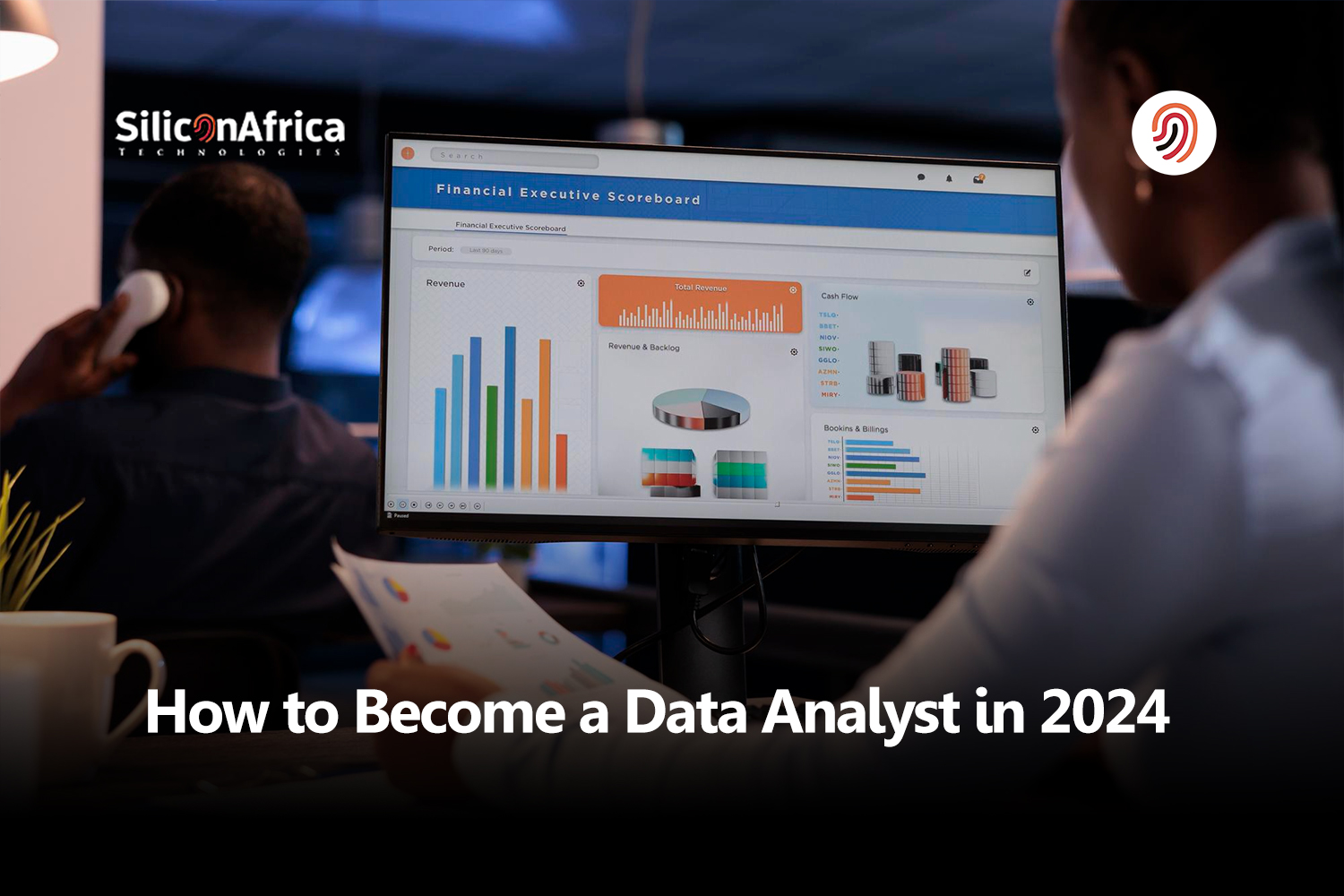Physical Address
60 Ekwema Cres, Layout 460281, Imo
Physical Address
60 Ekwema Cres, Layout 460281, Imo

Starting a career as a data analyst is a process of developing analytical skills, technical knowledge, and business acumen. It necessitates a dedication to comprehending massive amounts of data and converting it into meaningful insights that inform strategic decisions.
If you’re curious about stepping into the booming field of data analysis in 2024, you’re on the right path to an exciting career. A data analyst’s job is all about examining numbers and patterns to help organizations make informed decisions. So, how do you become a data analyst? Starting with a strong foundation in statistics and computer science is key.
It’s also essential to master data analysis software and programming languages such as SQL and Python. The roadmap to becoming a data analyst involves getting the right education, gaining hands-on experience through internships or projects, and continuously learning to keep up with new technologies.
Moreover, stepping into this career not only offers intellectual satisfaction but also comes with promising financial rewards. A data analyst’s salary is known to be quite competitive, reflecting the high demand for these professionals.
In this post, we’ll go over each of these steps on how to become a data analyst, so you know what you need to know to get started. Let’s dive in!

A data analyst is someone who collects, processes, and uses statistical techniques to transform raw data into valuable insights. Think of them as data detectives. They sift through numbers and trends to help businesses make smarter decisions. So, how do I become one? The data analyst roadmap starts with sharpening your skills in math, statistics, and computer software. Most enter the field with a degree related to data science or analysis.
Landing a job typically involves showcasing your ability to interpret data and providing examples of how your insights can drive business growth. It’s a role that combines analytical skills with a strong understanding of the industry you’re working in.
Becoming a data analyst is a promising career path for those with a knack for numbers and a curiosity to understand what those numbers mean. With the explosion of data in today’s digital world, the demand for skilled analysts is higher than ever.
Related – 35 Best Computer Engineering Project Topics for Final Year Students
Lately, more people are looking into how to become data analysts. This job is getting a lot of attention, and it makes sense because we’re creating so much data nowadays.
Businesses from all kinds of fields need experts who can take control of this data, look into it, pull out important information, and then use that information to tackle big business issues. So, there are quite a few good reasons why you might think about going into data analysis as a career
A data analyst is a professional responsible for collecting, processing, and performing statistical analyses of data. Their primary role is to turn data into information and insights that can help inform business decisions. The tasks and responsibilities can be diverse and may vary across different industries and organizations.
Their main responsibilities entail:

Becoming a data analyst can be a fascinating and lucrative career path for anyone who has a penchant for numbers, patterns, and problem-solving. Today, the work of a data analyst is more important than ever across a variety of businesses. They are the sleuths of the digital age, turning raw data into understandable insights that can drive business decisions.
Let’s break down the data analyst roadmap into understandable, bite-sized steps.
While you don’t necessarily need a specific degree to become one, having an educational background in a related field can be extremely helpful. Degrees in mathematics, statistics, computer science, information technology, or even economics provide a strong foundation.
Data analysts require a mix of technical skills. Here are some essential ones:
While technical skills are vital, soft skills play a crucial role in a data analyst’s success. Key soft skills include:
One of the most critical aspects in preparing to become a Data Analyst is determining how you will demonstrate your abilities and knowledge. A professional portfolio is essential, and to get started, you should publish the code you’ve created (even if it was part of your coursework) on GitHub to demonstrate your abilities and begin developing your professional portfolio.
Tips for Creating a Portfolio.
When it comes to data projects, choose something that piques your interest, pose a question about it, and then attempt to answer it with data. A well-executed data project that you complete on your own might be an excellent method to exhibit your data analysis skills and wow prospective employers.
Read Also – Simplest Tech Jobs that do not Require Coding
Gaining practical experience is like getting your hands dirty to learn how to be a data analyst. Instead of just reading books or watching tutorials, you dive into real-life projects. Imagine collecting data, sorting it out, and making sense of numbers like solving a puzzle. This hands-on approach helps you understand the tools and techniques used in the industry, making you job-ready and more confident in your skills.
Hands-on experience is invaluable. You can gain experience through:
A plethora of data analyst jobs are accessible for those equipped with data skills. These roles, which range from entry-level to more advanced positions, rely heavily on data analytics.
The landscape of data analyst jobs is continuously expanding, with new uses for analytics emerging regularly. Consequently, the roles mentioned here are expected to undergo further evolution as data analysis becomes increasingly integrated into various sectors.
This rapid evolution of the field, as noted by consulting giant McKinsey & Co., may lead to a situation where the demand for professionals exceeds the available supply by 50 to 60 percent, rendering the filling of job positions more challenging. This scenario underscores the advantageous position of individuals with these skills in navigating a career within this sphere
According to the U.S. Bureau of Labor Statistics, the job market is expected to expand by 23% from 2022 to 2032, with companies offering highly competitive salaries.
With promising career opportunities in the field of data, it’s understandable why an increasing number of individuals are considering a shift in their career paths. Nonetheless, we recognize that making a career change involves more than just the allure of a good salary and job stability; it’s also about finding a role that you’re passionate about and excel in.
The primary sectors hiring a significant number of data analysts encompass organizational administration, design of computer systems, credit intermediation (including brokerages for mortgages and loans), insurance providers, and consultancy in management, science, and technology.
Cities leading in the employment rates for are:
Enhancements in analytical software have made operations research more cost-effective, enabling various industries to efficiently utilize their data.
As companies aim to gather crucial insights for guiding decision-making across various departments and roles, there will be a growing need for competentency in these sectors.
Also Read – https://siliconafrica.org/entry-level-tech-jobs/
The typical Data Analyst income is $75,456, while the average Senior Data Analyst earns $96,852.
While data analytics salaries can vary widely by sector and geography, the average salary range for data analysts tends to be:
Entry-level Data Analysts can expect to earn around $70,000 per year, though this varies depending on location and organization.
Intermediate Data Analysts can expect to earn around $78,000 per year, though this varies depending on experience, region, and organization.
Senior Data Analysts can expect to make roughly $97,000 per year, but this depends on management experience, region, and organization.
Specific competencies can drive average Data Analyst salaries even higher. According to IBM’s research, data analysts with MapReduce competence earn an average yearly salary of $115,907.
Similarly, Data Analysts with experience utilizing Apache Pig, Hive, and Hadoop are looking for positions paying more than $110,000 a year. Building this skills today could put you in a good position to capitalize on a sector that appears to be expanding rapidly.
Embarking on the journey to become a data analyst in 2024 means diving into a world where data rules. By following a data analyst roadmap, anyone can break into this field, armed with a blend of technical skills and curiosity.
With dedication, acquiring the right education and gaining hands-on experience will undoubtedly unlock many data analyst job opportunities.
The rewards are substantial, not just in the fascinating work but also in the attractive data analyst salary, making this career path both intellectually and financially fulfilling.
Typically, you’ll need at least a bachelor’s degree in data science, statistics, computer science, information technology, or any related field. Advanced positions may require a master’s degree or specific certifications.
Yes, certifications can enhance your resume. Some of the popular ones include:
– Certified Analytics Professional (CAP)
– Cloudera Certified Associate (CCA) Data Analyst
– Microsoft Certified: Data Analyst Associate
– Tableau Desktop Certified Associate
Starting as a data analyst, you could progress to senior data analyst, data scientist, data analytics manager, or director of analytics.